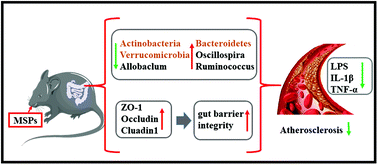Millet shell polyphenols prevent atherosclerosis by protecting the gut barrier and remodeling the gut microbiota in ApoE−/− mice
Abstract
Atherosclerosis, the major cause of cardiovascular disease, is a chronic inflammatory disease. The anti-inflammatory effect of certain polyphenols has been recognized. Active polyphenols were extracted from millet shells (MSPs), and their main components including 3-hydroxybenzylhydrazine, luteolin-3′,7-diglucoside, N-acetyltyramine, p-coumaric acid, vanillin, sinapic acid, ferulic acid and isophorone exhibited the anti-atherosclerotic potential in vitro. To explore the anti-atherosclerotic activity of MSPs in vivo, a classic atherosclerosis model was constructed in ApoE−/− mice fed with a high-fat diet. The results showed that MSPs effectively inhibited the development of atherosclerotic plaques in the aorta and reduced the levels of lipopolysaccharide (LPS) and inflammatory cytokines such as tumor necrosis factor-α (TNF-α) and interleukin-1β (IL-1β). A further study found that the expression of tight junction proteins (occludin, zona occludens-1 and claudin1) was obviously up-regulated in the MSPs-treated group at the mRNA and protein levels. Interestingly, MSPs significantly changed the structure of gut microbiota in ApoE−/− mice with a high-fat diet, which is characterized by the enriched Oscillospira and Ruminococcus, and the abridged Allobaculum at the genus level. Collectively, these results suggest that MSPs regulate the integrity of the gut barrier and the structure of the gut microbiota, ultimately inhibiting the development of atherosclerotic plaques. This study provides new insights into the potential cardiovascular protective effects induced by millet shell polyphenols.



 Please wait while we load your content...
Please wait while we load your content...